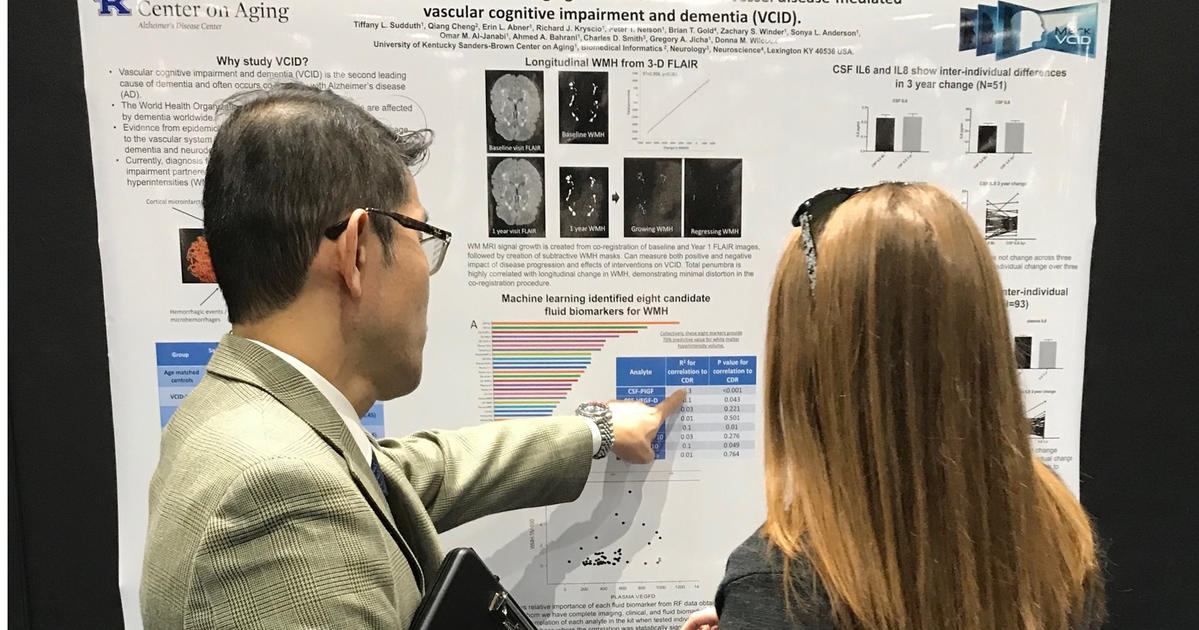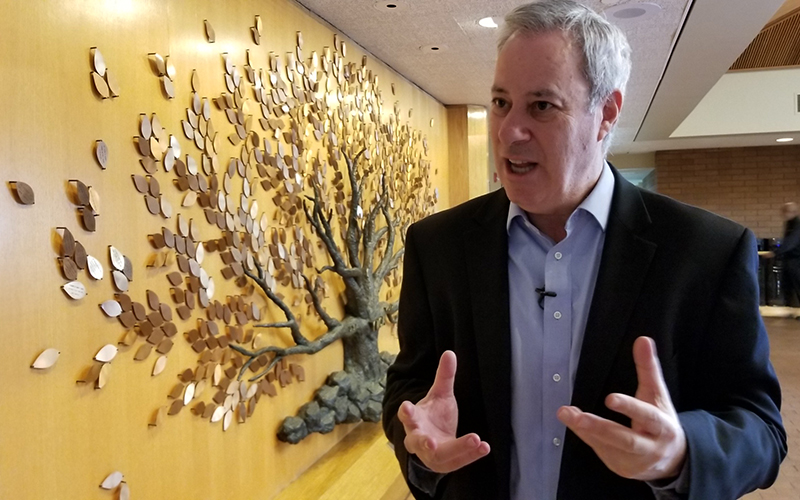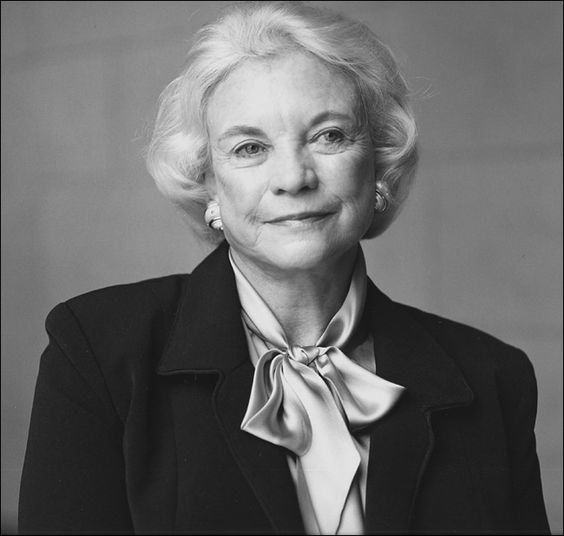
"A new Canadian study finds that drinking coffee, particularly dark roast, may help lower your risk of developing both Alzheimer’s and Parkinson’s disease. The researchers discovered that natural coffee compounds known as phenylindanes, which emerge as a result of the bean roasting process, appear to inhibit the clumping of both beta amyloid and tau, two protein fragments common in Alzheimer’s and Parkinson’s. 'Coffee consumption does seem to have some correlation to a decreased risk of developing Alzheimer’s disease and Parkinson’s disease,' said Dr. Donald Weaver, co-director of the Krembil Brain Institute in Toronto. 'But we wanted to investigate why that is — which compounds are involved and how they may impact age-related cognitive decline.'"
Posts tagged as “AD”

LEXINGTON, Ky. (Nov. 7, 2018) — Research at the University of Kentucky Sanders-Brown Center on Aging has identified two potential ways to predict vascular cognitive impairment and dementia (VCID) – the second leading cause of dementia behind Alzheimer's disease.
About 10 percent of all dementia cases are caused by VCID, while Alzheimer's accounts for between 60 and 80 percent.
Sanders-Brown researcher Tiffany Lee analyzed 29 proteins in cerebrospinal fluid and blood plasma from 115 individuals with cognitive impairment.
From that, she was able to identify a collection of seven features that predicted cognitive impairment with an 86 percent accuracy.
The other sites are Boston University, Rush University, Johns Hopkins, University of Southern California, UCSF/UC-Davis and the University of New Mexico.

"Investing in companies taking an anti-amyloid approach are not likely to produce high dividends (literally and figuratively) while investing in companies like Anavex and Neurotrope may eventually pay off. Amyloid oligomers are one of several factors that lead to nitro-oxidative stress in Alzheimer's disease and they do not reverse that stress. At the recent CTAD conference in Barcelona, Spain a number of companies presented new data regarding their Alzheimer’s drug candidates. Much of the attention focused on Biogen (BIIB), but other companies may be pursuing more fruitful strategies against Alzheimer’s disease. In many cases, results reflect the likely mechanisms of the disease whether its Biogen’s efforts to remove amyloid oligomers, Anavex’s (AVXL) focus on inhibiting intracellular calcium release, or Neurotrope’s (NTRP) hopes founded on the activation of protein kinase C. To a degree, each company’s efforts are linked to the chain of events that leads to the onset and progression of Alzheimer’s disease."

"Researchers analyzed brain tissue sourced from people who had both diabetes and Alzheimer’s. The findings suggest that some anti-diabetes drugs that these people used offered protection that kept the neurodegenerative disease from progressing as rapidly as it would have otherwise. Many elderly people with diabetes have brain changes that are hallmarks of Alzheimer’s. Previous studies have suggested that there is a link between the risk of cognitive impairment, dementia, and type 2 diabetes, and there is evidence that an insulin receptor pathway in the brain is associated with Alzheimer’s pathologies, though the mechanism remains unknown."
![]()
"The second movement of Ludwig van Beethoven's Seventh Symphony begins with a minor-key rhythm in the cellos. It sounds like a background rhythm, which it becomes when the violins introduce a second, soaring and entirely different melody. One half the Baltimore Symphony is on stage playing one thing; the other half, another. Next to me, my wife, Carol, leans forward and smiles. Beethoven must have been in a good mood when wrote this, perhaps a bit nostalgic, whimsical. Carol appears to appreciate what he was doing. That surprises me. Carol understands very little these days. Sixty-nine years old, she is six years into early onset Alzheimer's disease, halfway through what former President Ronald Reagan, who also had Alzheimer's, called "the journey that will lead me into the sunset of my life.""

"Drs. Dean and Ayesha Sherzai, co-directors of the Brain Health and Alzheimer’s Prevention Program at Loma Linda University Health, encourage many to take control of their lifestyle choices because they play a significant role in their long-term healthcare. Two Loma Linda University Health neurologists are on a mission to prevent or reverse Alzheimer’s disease — which affects more than 5 million people in the United States — by educating their patients and the community to implement protective factors centered around healthy eating, regular exercise, restful sleep and optimal activities to challenge the mind."

"Elaine May returns to Broadway after more than 50 years away from the stage in the recently opened "The Waverly Gallery." The play, written by Academy Award winner Kenneth Lonergan, portrays the toll Alzheimer's takes on a family. May, 86, is known as part of the comedy duo Nichols and May, and for directing films including the 1972 romantic comedy "The Heartbreak Kid." Her latest performance as Gladys Green, a grandmother in the early stages of the disease and who is on the brink of losing her Greenwich Village art gallery, is emotionally crushing."

"After long days at school and work, she and her mom, Robyn Forbes, come home to care for Hailey’s 82-year-old grandfather, Jim, who has Alzheimer's. A former naval officer, he now struggles with everyday tasks, sometimes forgetting his family's names — a very different person than the man they grew up with.
“I describe him as my rock. He was strong, smart, funny — everything that you could ask for in a dad,” Forbes said."

"TGen’s MindCrowd seeks 1 million people around the world to help cure Alzheimer’s.... The project, which has screened about 125,000 people with its 10-minute
online test since it started in 2013, has identified several factors that are correlated with memory function, according to Matthew Huentelman, founder and principal researcher for MindCrowd."

"Like many, I was devastated to learn of retired U.S. Supreme Court Justice Sandra Day O’Connor’s disclosure of a dementia diagnosis, the start of a journey that nine years ago robbed the life of her husband. While a moderate conservative, Justice O’Connor was a courageous bipartisan swing vote in key cases when integrity and fairness trumped of the day. No surprise here: She was confirmed to the Supreme Court on a 99-0 vote..."
